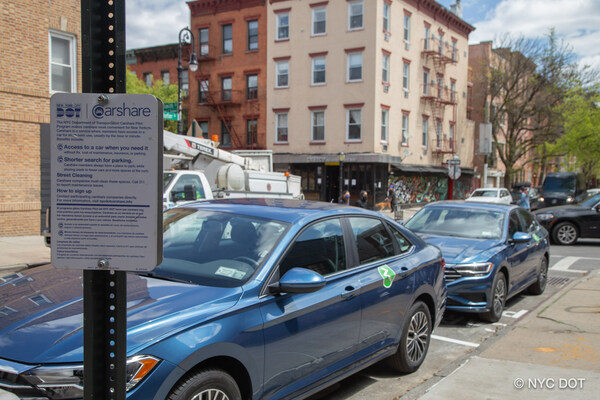2022 Zipcar North American Transportation Survey Reveals NYC-Members’ Quality of Life Improves with Affordable Access to Shared Vehicles
NEW YORK, Feb. 7, 2023 /PRNewswire/ — More New Yorkers who need easy, on-demand access to vehicles in convenient, on-street locations will soon be able to access additional Zipcar vehicles parked on New York City curbs. The New York City Department of Transportation today announced that the first eighty of hundreds of new curbside parking spaces reserved for its Carsharing Program will be installed starting today in Brooklyn, Queens, and the Bronx.
Zipcar has operated in New York City since 2001, and since the NYC DOT Carsharing Program launched in 2018, Zipcar learned that some of the most successful areas in the pilot are previously underserved by carshare, such as the Bronx and outer Queens. The initial launch of the permanent program includes twenty-four Zipcar vehicles that will now provide nearly one-thousand households in New York with access to a fleet managed by the world’s leading car-sharing network. New, on-street Zipcar locations launching in February with two vehicles per street location, include:
Queens
- 11-58 49th Avenue (between 11th & 21st Streets)
- 49-1 21st Street (between 49th & 50th Avenues)
- 37-5 64th Street (between 37th & 39th Streets)
Brooklyn
- 34 Gunther Place (between Atlantic Avenue & Herkimer Street)
- 2065 Pacific Street (between Howard Avenue and Saratoga Avenue)
- 34 Marconi Place (between Atlantic Avenue & Herkimer Street)
- 1209 Herkimer Street (between Rockaway Avenue and Thomas S Boyland Street)
- 2310 Dean Street (between Rockaway Avenue and Thomas S Boyland Street)
The Bronx
- 3138 Westchester Avenue (between Arnow Place and Willow Lane)
- 3120 Wilkinson Avenue (between Bruckner Boulevard and 3120 Wilkinson Avenue)
- 2537 Frisby Avenue (between St. Peters Avenue and Overing Street)
- 2800 Bruckner Boulevard (between Barkley Avenue and Bruckner Boulevard)
Zipcar will continue to provide equitable access to transportation through its partnership with the New York City Housing Authority (NYCHA) and by locating a high percentage of Zipcars in Equity Zones designed by the NYC DOT.
Angelo Adams, Head of Zipcar, on Zipcar’s On-Street Expansion
“We are grateful to work with the New York City Department of Transportation and the communities it serves to provide more New Yorkers with access to Zipcar’s professionally maintained fleet of shared vehicles. From our pilot data and more than two decades of serving New York City, we know there is a genuine need to provide more on-demand access to vehicles, given the high cost and hassle of owning one in the city. Together with the NYC DOT, Zipcar is dedicated to decreasing congestion and carbon emissions while providing convenient, equitable transportation options to New Yorkers, including with more hybrid and electric vehicles.”
As part of its continued commitment to reducing emissions and expanding its eco-friendly fleet, Zipcar expanded its fleet by adding 800 hybrid vehicles in 2022. Zipcar was the first car-sharing provider in the U.S. to introduce electric and hybrid vehicles in its fleet. With these new vehicles, Zipcar increased its hybrid fleet by 10% and is planning to add more fuel efficient, hybrid and electric vehicles to its fleet later this year, including in New York.
New York City-Specific Results from Zipcar’s New North American Transportation Survey
According to Zipcar’s 2022 North American Transportation Survey, 44% of New York City-based members report driving Zipcars for out-of-town destinations and convenience, cost and sustainability are at the forefront of their carsharing choices:
Convenient Access Eliminates Need for Personal Vehicles
- 84% of members report that picking up a car at an on-street location is more convenient and 60% would like to see more Zipcars parked on-street and in municipal lots;
- 88% of members access their trips by walking and 30% by public transit; and,
- 89% of members do not own a personal vehicle; 42% postponed buying/leasing after joining; 68% state Zipcar is an important factor in their lives
Equitable Transportation Provides Improves Quality of Life
- Approximately 69% of black, indigenous, and people of color members say their quality of life has improved since joining Zipcar;
- Members with household incomes below $35,000 report that Zipcar has improved their quality of life (76%), gives them financial freedom (54%), equal access to opportunities (57%), and affordable access to important places like school and work (57%), and the opportunity to explore places inaccessible by transit (78%); and,
- According to AAA, the average yearly cost to own and operate a new vehicle is $10,728 or $894 a month – plus the cost of parking; Average Zipcar members save up to $800 per month compared to car owners.
Carsharing is Environmentally Friendly
- Zipcar’s professionally maintained fleet sees 23% more MPG than the US average;
- Members drive 73% fewer miles than they would if Zipcar weren’t available, producing fewer carbon emissions from purpose-driven trips; and,
- Members reduce their carbon footprint by up to 1,600 lbs. per year.
Zipcar provides 24/7 on-demand access to vehicles by the hour, day or week in convenient urban, college or business locations with gas, insurance options, maintenance and parking included, making it a more cost-effective and sustainable option than personal car ownership. Membership is $9 a month or $90 a year, with driving rates starting from $12.50/hour and $103/day.
About Zipcar
Zipcar is the world’s leading car-sharing network, driven by a mission to enable simple and responsible urban living. With its wide variety of self-service vehicles available by the hour, day or week, Zipcar operates in urban areas and university campuses in hundreds of cities, towns, and universities. Zipcar is a subsidiary of Avis Budget Group, Inc. (Nasdaq: CAR), a leading global provider of transportation solutions. More information is available at www.zipcar.com.
SOURCE Zipcar

